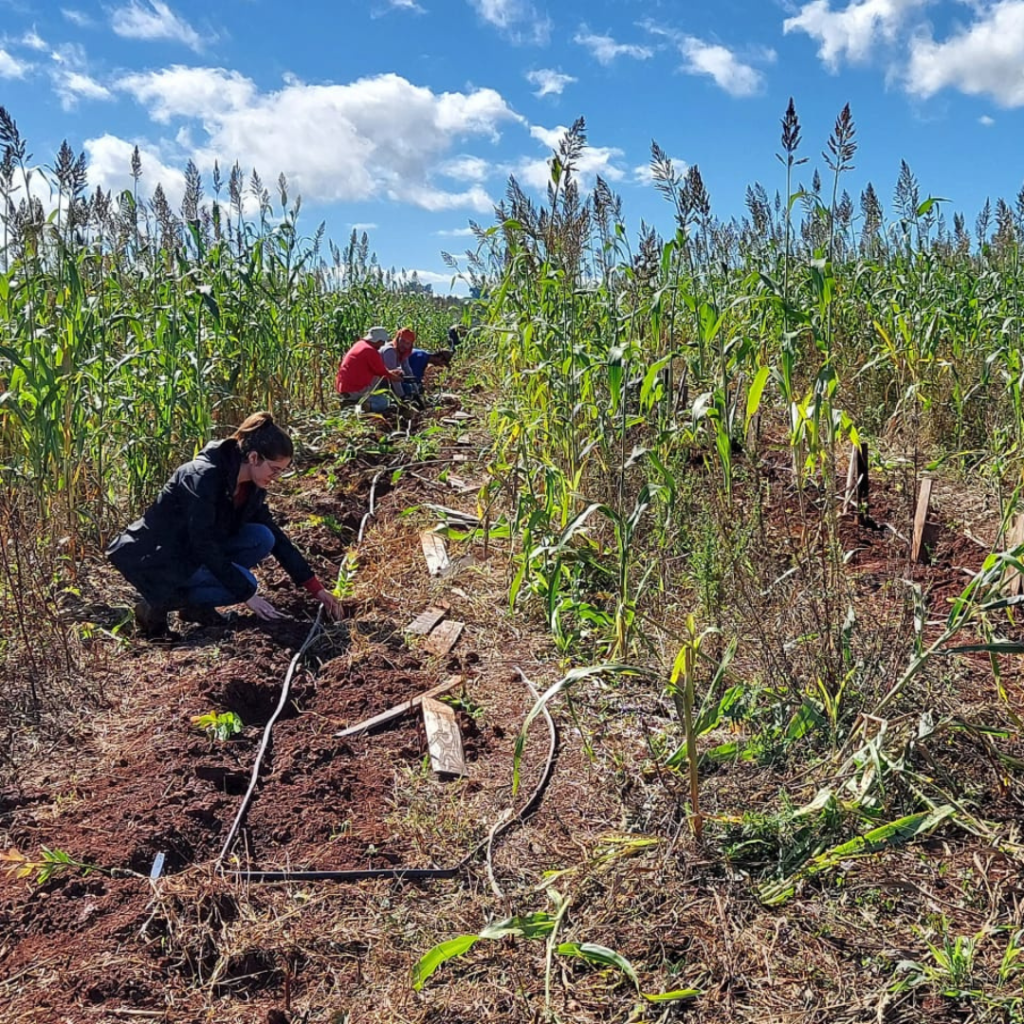In the constant search for excellence and innovation in the cultivation of yerba mate, Ervais do Futuro stands out for implementing clonal tests. In partnership with renowned institutions such as Embrapa Florestas and UFSM, our property is one of the few places in Brazil where clonal tests of yerba mate are carried out. These studies are fundamental to improving the quality and productivity of yerba mate, in addition to promoting the genetic conservation of the species.
How is cloning carried out?
Vegetative propagation or cloning is the process by which all genetic information from a selected mother plant is reproduced, generating genetically identical plants, clones. There are two main techniques for vegetative propagation in tree species, grafting and cuttings, both widely used for thousands of years.
-Grafting: Widely used in fruit growing, grafting consists of joining a small section of the apex of an adult plant to a seminal rootstock. This technique is effective in anticipating the reproductive period and smaller plant size.
-Cuttings and Minicuttings: Consists of the use of plant segments, generally branches (cuttings or minicuttings) of the mother plants, which, after going through a period of rooting, will be capable of generating new complete plants, genetically identical to the matrix. In the case of yerba mate for leaf production purposes, cuttings or minicuttings are the most recommended vegetative propagation techniques, due to the rejuvenation process and greater vigor of the plants.
Yerba mate cloning
Vegetative propagation allows the reproduction of yerba mate plants with desirable characteristics, such as high levels of bioactive compounds, greater productivity and resistance to pests, diseases and water deficit.
In yerba mate, cloning is especially valuable due to the species’ great genetic variability. Some clones can be practically decaffeinated, while others have high caffeine levels. As these characteristics are largely genetically determined, cloning of plants of interest is the most effective method to guarantee levels of bioactive compounds suitable for industrial purposes. Thus, cloning allows uniformity and standardization of the raw material, essential factors considering the industrial extraction of bioactive compounds or beverage industries focusing on energy or decaffeinated drinks, for example.
Advantages of Using Yerba Mate Clones
-Uniformity and standardization: As clones have the same genetic information, plants are expected to respond in a similar way to the growing conditions in which they are inserted. When we think industrially, we want standardized, high-yield raw materials. Thus, clonal crops with superior genetic materials can maximize the production of leaves and bioactive compounds.
-Resistance to Pests, Diseases and Water Stress: Different genetic materials respond differently to the environmental stresses to which they are naturally subjected. By selecting matrices that are more tolerant to certain stresses, we increase crop productivity.
-Environmental Sustainability: Cloning contributes to the genetic conservation of yerba mate, as older trees can be propagated and cultivated in other locations, keeping their genetic material alive. It also favors the sexual reproduction of individuals from different regions, which naturally would not exchange gametes, and thus increases genetic diversity within the species.
Scientific Partnerships and Results
Ervais do Futuro collaborates with Embrapa Florestas, UFSM and UFPR on several research projects, providing areas for carrying out scientific experiments. On our property, 25 potential clones of yerba mate from different Brazil regions, are tested to evaluate their performance in production and chemical characteristics.
These tests are essential to determine how clones behave in different environmental conditions, enabling the selection of superior genetic materials for commercial cultivation. The indication of the best clones allows obtaining superior productivity and standardized phytochemical characteristics of yerba mate, meeting the demands of the industry and the consumer market. Thus, clonal tests represent a crucial innovation for yerba mate cultivation.
At Ervais do Futuro, we believe that science and innovation are fundamental pillars for the sustainable development and preservation of yerba mate. Through scientific partnerships and the implementation of field experiments, we are at the forefront of producing high-quality yerba mate, contributing to a more sustainable and productive future.
To learn more about our practices and innovations in the cultivation of yerba mate, continue following our blog and social media. Together, we are shaping the future of yerba mate, with respect for the environment and a commitment to quality.
References:
Cardozo Junior, EL et al. Quantitative genetic analysis of methylxanthines and phenolic compounds in mate progenies. Brazilian Agricultural Research, v. 45, no. 2, 2010. https://doi.org/10.1590/S0100-204X2010000200008
Duarte, MM et al. Seasonality and genotype influence on Ilex paraguariensis cuttings rooting and bioactive compounds. Plant Genetic Resources: Characterization and Utilization, v. 21, no. 2, 2023. https://doi.org/10.1017/S147926212300059X
Friedrich, JC et al. Genetic and phytochemical analysis to evaluate the diversity and relationships of mate (Ilex paraguariensis A.St.-Hil.) elite genetic resources in a
germplasm collection. Chemistry & Biodiversity, vol. 14, no. 3, 2017. https://doi.org/10.1002/cbdv.201600177 .
Wendling, I.; Santin, D. Propagation and nutrition of yerba mate. Embrapa, 2015.





